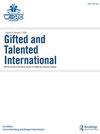Gifted education’s reflection of country-specific cultural, political, and economic features
Q3 Social Sciences
引用次数: 6
Abstract
ABSTRACT Educational policies and practices are influenced by cultural, political, and economic factors, and this is also true of specialized educational approaches such as gifted education. Factors such as a country’s cultural tendency toward egalitarianism or meritocracy, whether the political system is centralized or decentralized, and the degree to which the economy supports basic education for all students may be reflected in the way in which a country approaches gifted education. We examined gifted and talented education policies and practices in 38 Organisation for Economic Co-operation and Development (OECD) member and partner countries and considered how those policies and practices may reflect country-specific characteristics. In this article, we discuss ways in which gifted education in OECD countries may reflect cultural, political, and economic features of countries.资优教育反映了国家特有的文化、政治和经济特征
教育政策和实践受到文化、政治和经济因素的影响,特殊的教育方法如资优教育也是如此。一个国家的文化倾向是平等主义还是精英主义,政治体制是集中的还是分散的,以及经济对所有学生基础教育的支持程度等因素,都可能反映在一个国家对待天才教育的方式上。我们研究了38个经济合作与发展组织(经合组织)成员国和伙伴国家的资优教育政策和做法,并考虑这些政策和做法如何反映各国的具体特点。在本文中,我们讨论了经合组织国家的资优教育可能反映国家文化、政治和经济特征的方式。
本文章由计算机程序翻译,如有差异,请以英文原文为准。
求助全文
约1分钟内获得全文
求助全文

 求助内容:
求助内容: 应助结果提醒方式:
应助结果提醒方式:


